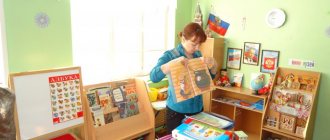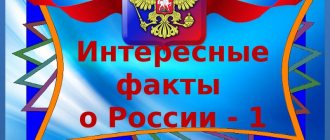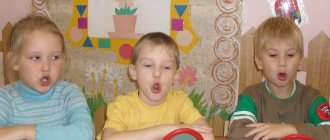Class hour on the topic: Russia is my homeland, 3rd grade
Class hour in 3rd grade on the topic: “Russia is my homeland”
Goals and objectives: 1. To form a respectful attitude towards the culture of my native country - Russia. Create an emotionally positive basis for the development of patriotic feelings for love and devotion to one’s homeland. 2. Expand students’ horizons about the world around them, enrich children’s vocabulary. 3. Introduce the symbols of the Russian state: flag, coat of arms, anthem. 4. Teach children cultural behavior during extracurricular activities, work in groups. 5.Develop children's creative imagination in the classroom. Materials and equipment: 1. Power Point presentation 2. Globe, map of Russia 3. Cards: with the words “Russia”, “Fatherland”, “Fatherland”, “Motherland”; clan, parents, relatives, pedigree, homeland; cards with deformed proverbs about the Motherland; envelopes with assignments for each group; chamomile drawing (chamomile petals). Progress of the lesson I. Introductory part, introduction to the topic of the lesson. Russia, Russia, Motherland, native side, father's house are the most precious words for a Russian person. Russia is “blue-eyed” and golden-headed, and wild, dozing and violent. This is the land of rain and bad weather. This is our wonderful island of the Motherland. We will talk about what the Motherland is, how we can call it differently. Look at the globe and the world map. This depicts our common home - planet Earth. II. (Russian Federation) – our Fatherland, our Motherland. Topic of the lesson. Let's think about what these words mean? 1. “Fatherland”, “Motherland”, “Fatherland”.
(children's statements) (Children turn to the Explanatory Dictionary) FATHERLAND - The country where a person was born and to whose citizens he belongs.
Love for the Fatherland. Defending your fatherland. FATHERLAND - the country in which you were born; fatherland, homeland. MOTHERLAND - Deposits of someone. 2. The meaning of the word Motherland according to the dictionary of synonyms:
Motherland - fatherland - fatherland 3. The country in which a person lives, the house in which he grows up, where the birch and apple tree are on his native threshold, the place where his ancestors lived - all this is the Motherland, that is, a person’s native place.
4. Listen to how K. D. Ushinsky talks about this in the text “Our Fatherland.”
“Our Fatherland, our homeland is Mother Russia.
We call Russia Fatherland because our fathers and grandfathers lived in it from time immemorial. We call it our homeland because we were born in it, they speak our native language in it, and everything in it is native to us; mother - because she fed us with her bread, gave us drink with her waters, taught us her language; like a mother she protects and protects us from all sorts of enemies...” 5. There are many states and lands in the world besides Russia, but a person has one mother, one homeland. Let's listen to poets' poems about the Motherland. (children read poems about the Motherland) My Russia has long braids, My Russia has light eyelashes, My Russia has blue eyes. Russia, you are very similar to me. For me, Russia is white birches, For me, Russia is morning dew, For me, Russia, you are the most precious thing. How much you look like my mother! You, my Russia, will warm everyone with warmth, You, my Russia, know how to sing songs, You, my Russia, are inseparable from us, After all, our Russia is me and my friends. 6.Teacher. Every person has relatives.
Let's find “relatives” to the word “homeland”.
(On the board there are cards - a group of related words: clan, homeland, parents, give birth, relatives, pedigree). How do you understand the meaning of each word? Ozhegov's explanatory dictionary. pedigree - a list of generations of one clan, establishing the origin and degree of relationship. 7. Let's continue the conversation about our Motherland. Our state is called the Russian Federation.
How does one state differ from another?
(symbolism, different languages - speech, customs, traditions, holidays, geographical location, history, name) III. Guys, have prepared pages from the history of Russia. “Our Motherland is very great and huge. The sun never sets over its expanses. When the hands of the Kremlin clock show three o'clock in the afternoon in Moscow, then midnight comes in Petropavlovsk - Kamchatka. - The territory of Russia would include, for example, such countries as Italy, England, France, Germany combined. — The nature of our large country is very diverse. It has many forests, fields, plains and hills, large and small rivers and lakes, snow-capped mountain peaks, and bright southern landscapes. “Our land gives people everything they need for life - fertile soils for crops, pastures for livestock, forest lands and mineral deposits. All these are the riches and treasures of our country Russia. IV. But the country's greatest and most important wealth is its people. Russia – Rus', wide and great. And people live everywhere - Russians. But Russians have different nationalities. Russia is a single multinational, democratic state. It is inhabited by more than 180 nationalities, nationalities, and ethnic groups. Each nation has its own customs, traditions, and language. And people say: “The friendship of peoples is great - the Motherland will be strong.” Peoples of different nationalities in our country have equal rights. This is written in the Constitution of our country. V. TRAINING - physical exercise “Sunny Bunny” You must determine whether the sunbeam is violating your rights. Sit straight at your desk and imagine that a sunbeam looked into your eyes - and you closed your eyes. Close your eyes.
He ran further over his face - gently stroke him with your palms on his forehead, nose, cheeks.
You should stroke the bunny carefully and gently so as not to scare it away. Stroke your head.
Oh, the bunny got into the collar.
Pet him there. He is not a mischievous person, he loves the guys, which means he does not violate their rights. After all, children have the right to play. VI. State symbols. 1. In addition to the Constitution,
every citizen of our country (even if he is small) is obliged to know state symbols.
What state symbols do you know? (Coat of Arms, Flag, Anthem) 2. The state flag
of the Russian Federation - a white-blue-red tricolor appeared in Russia in 1693: Peter 1 used it as the “flag of the Tsar of Moscow.”
And since 1705, the tricolor flag has become the trade flag of Russia. Since then, the white-blue-red tricolor has been born three times. The last time this happened was in 1991. What do you think each color of the flag represents? White is the color of the world. He talks about the peacefulness of our country. Blue color is faith, fidelity. The people love their country, protect it, and are loyal to it. Red is the color of power. This is the color of blood shed for the Motherland and its independence. 3. What is depicted on the coat of arms?
— What is a Coat of Arms?
The coat of arms of Russia is a double-headed eagle - a symbol of the sun, heavenly power, fire and immortality. This is a very ancient coat of arms: it appeared 500 years ago, in 1497. It was first introduced by the Grand Duke of Moscow Ivan III Vasilyevich. But why does the eagle have 2 heads? The double-headed eagle, guarding the state, looks both to the west and to the east. The crown on the eagle's head is a symbol of legality, meaning that the country lives according to the laws of honor and justice. In one paw of the eagle there is a scepter - a symbol of power, and in the other paw - a golden ball, which is called “power” - a symbol of the power of the country. 4. Another symbol of the Russian Federation is the National Anthem.
The verses of the anthem were written by S. Mikhalkov to the music of A. Alexandrov.
You need to listen and perform it while standing. VII. Work in groups Group 1 - create a flag for our class, with protection. Group 2 – coat of arms (emblem) of the class, with protection. Group 3 - choose a motto for the class, explain the meaning. We got acquainted with the symbols of Russia. Among the differences between one state and another, you also named the customs and traditions of the Russian people. VIII.One of the types of folk art are proverbs and sayings about the Motherland. (task “Collect a proverb.” Children make up a proverb in groups and explain the meaning.) Every bird loves its nest. Everyone has its own side. The native side is the mother, the alien side is the stepmother. On the other side, even spring is not beautiful. A man without a homeland is like a nightingale without a song. The Motherland is your mother, know how to stand up for her. Experts in riddles have long been revered in Rus'. In folklore, it was precisely such heroes who often turned out to be winners of various competitions. Each riddle contained a lot of valuable information about the world around us. A person with such knowledge was rightfully considered wise and savvy. IX.Riddle. The slender beauty is famous throughout all countries: White clothes, Gold earrings, With an unbraided braid, Washed with dew. (Birch) Why BIRCH is a symbol of Russia. Translated into Russian, the name of the tree means “to protect”, from the word “bereginya” (a pagan deity among the Slavs, which they considered the mother of all known spirits and it was her image that people associated with the birch tree). In addition, this plant was initially associated with health and fertility, and only later it began to be considered a symbol of femininity and beauty. X. What do you think unites all of us present here? (We are Russians. - What kind of Russians are we? To answer this question, let’s play the game “Guess it.”
- What do they call a person who knows how to live peacefully, amicably, without quarrels? (peaceful) - A person who knows how to do things himself quality of their duties? (responsible) - A person who loves to work (hardworking) - A person who is always ready to help in difficult times (responsive) - A person who knows how to heroically defend the interests of the state and its territory (courageous)
XI. Lesson summary. Reflection. • What is the name? our Motherland? • What are the people living in Russia called? • Why do we have a special relationship with Moscow? Pay attention to the picture of a daisy located on the board, each state has a symbol - a flower. And such a symbol of Russia is the daisy. Why is the symbol of Russia the daisy " CAMOMILE is a symbol of Russian nature. According to ancient Russian legends, chamomile grows where a star fell. There is a legend according to which in ancient times daisies served as umbrellas for little steppe gnomes, and the gnomes did not get wet under them. Chamomile is used to weave wreaths, and of course, it is the first adviser in fortune-telling “loves or dislikes.” And the most amazing thing is that chamomile is the ancestor of large-flowered chrysanthemums. What would you wish to every person living in Russia, to your friends? Write a wish on a chamomile petal and combine it into a chamomile, in groups. Take care of Russia - there is no other Russia. Take care of its peace and quiet, This is the sky and the sun, this bread on the table And the dear little window in a forgotten village. Take care of Russia, we cannot live without it. Take care of her so that she will be forever. Our truth and strength, our whole destiny. Take care of Russia - there is no other Russia! Literature: 1. Mozheiko I.V. State symbols of Russia. Moscow. 2003. 2. Chutko N. Ya. Methodological explanations for the textbook - anthology “I am a citizen of Russia”. 3rd grade - - Samara: Fedorov Corporation, 2004
We recommend watching:
Class notes for 3rd grade Class hour 3rd grade. Bread is the head of everything Class hour 3rd - 4th grade. My friend - book Class hour on the topic "The Baptism of the Lord", 3rd grade
Similar articles:
Class notes in elementary school: “I am a family – Mordovia – Russia”
Class hour in 3rd grade. Communication culture
Class hour in 3rd grade on the topic: Etiquette
Cool hours in 3rd grade
Class hour in 3rd grade with a psychologist
Topic: Our country. My native land. Where does the Motherland begin?
Correctional educational goals:
— introduce children to the flag, anthem and coat of arms of Russia.
Corrective and developmental goals:
- strengthen the ability to form adjectives from nouns; - develop the ability to coordinate words in sentences; - activate the dictionary on the topic.
Corrective educational task:
- cultivate a sense of pride in your country.
Equipment: map of Russia, plot pictures during the lesson, pictures depicting animals, plants and birds living in various places on the planet, pictures depicting the flag, coat of arms of Russia, recording of the Russian anthem.
Progress of the lesson:
1. Organizational moment.
The children sit at the tables. The speech therapist reads the poem “Where does the Motherland begin?”
Where does the Motherland begin? From the picture in your primer, From good and kind comrades, Living in the neighboring yard. Or maybe it begins, With the song that our mother sang to us, With the fact that no one can take it away from us in any trials.
2. Announcement of the topic.
Today in class we will talk about what the Motherland is for every person and where it begins.
3. Introductory conversation.
So where does the Motherland begin? Homeland is the country in which you were born, it is the house in which you live, it is your family and friends.
Our home, city, country.
Our country is Russia. Each country has a flag, anthem and coat of arms. Our Russian flag has three stripes. White means purity and justice. Blue is a peaceful sky. Red - strength and beauty. This flag was introduced into Russia by Tsar Peter 1. When the national anthem is played and the national flag is raised, the citizens of this country stand up. Each country also has its own coat of arms. The coat of arms of Russia is a double-headed eagle.
You live in a city, town or village, and this place is necessarily marked on the map. But besides this, each person has his own home. People all over the world live in a wide variety of homes. They build them from various materials. Some houses are built of brick or stone, others of wood, clay or reeds.
4. Development of lexical and grammatical categories.
Game "Where do I live?"
My country is called ... (Russia) The capital of our country is ... (Moscow city) My city (village) is called - ... My home address is -
Game “Which, which, which?” (Based on plot pictures)
A city in Russia is a Russian city. A village in Russia is a Russian village. Passport of a citizen of Russia - Russian passport. Moscow is the capital of Russia - the Russian capital. The people who live in Russia are the Russian people. Monuments of Russia – Russian monuments. Our Motherland, what is it like? - Immense, boundless, rich, beautiful, powerful, huge. What needs to be done to keep it that way? To love, cherish, protect, preserve her wealth. What are the people called who stand guard over the Motherland? (Defenders of the Fatherland)
Physical education minute.
There is no more beautiful Motherland in the world - (Children walk in place) A fighting country of heroes. (They portray “heroes”) Here it is, called Russia, (They walk in place) It stretches from the seas to the seas. (spread their arms wide) A. Prokofiev.
Game “Animals and Plants of the Native Land”
Find animals, plants and birds that live in Russia. (Children are offered pictures depicting animals, plants and birds living in various places on the planet.)
Game "Where will I go for a walk"
Children look at pictures depicting the sights of their native land and tell where they would like to go for a walk or go on a trip.
On weekends I will go for a walk with mom and dad to the park. And I’ll go on a hiking trip to the bank of our river, etc.
5. Summary of the lesson.
The speech therapist offers to listen to the Russian anthem and reminds us how to behave when the anthem of our native country is played.



